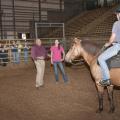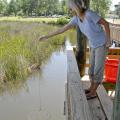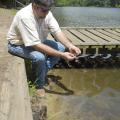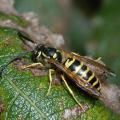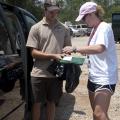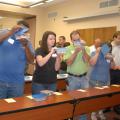Feature Story from 2010
MISSISSIPPI STATE -- Therapeutic riding, like other medical treatments, has come a long way in recent decades.
Therapeutic riding is a specialized equine activity that provides physical, emotional and psychological benefits to people with cognitive and physical disabilities.
Anthony Busacca, a master’s level instructor with the North American Riding for the Handicapped Association, has more than 20 years of experience in therapeutic riding. He said the advancements can be seen in every aspect of the therapy.
MISSISSIPPI STATE – Mississippi row crop producers are facing a growing problem, as five common weeds have developed resistance to the primary herbicide used to manage them.
Roundup is the trade name for glyphosate, a powerful broad-spectrum herbicide that can kill a wide range of weeds in varying growth stages. But by the 2010 growing season, 19 weeds worldwide had become resistant to glyphosate, and five are found in Mississippi. These weeds are horseweed, Italian ryegrass, Johnsongrass, and Palmer amaranth and waterhemp -- both species of pigweed.
MISSISSIPPI STATE – Mississippi is one of six states participating in a study monitoring the problem of glyphosate-resistant weeds and trying to prevent any more from developing.
Roundup is the trade name for glyphosate, a powerful broad-spectrum herbicide that can kill a wide range of weeds in varying growth stages. Seed genetically modified to be resistant to glyphosate is known as Roundup Ready seed. With Roundup Ready cropping systems, producers can apply glyphosate across a field, killing weeds but leaving the crop undamaged.
MISSISSIPPI STATE – Weeds that have developed resistance to the commonly used herbicide glyphosate are forcing row crop farmers to change their production methods to battle the problem.
Five weeds found in Mississippi have developed resistance to glyphosate, the active ingredient found in Roundup herbicide. Since 1996, this broad spectrum herbicide has been used extensively as an easy and effective way to control weeds in row crops that have been genetically modified to withstand the chemical.
MISSISSIPPI STATE – Anyone growing muscadine grapes in Mississippi is invited to attend the Aug. 21 Muscadine Field Day in Pearl River County.
Mississippi State University’s Extension Service and the U.S. Department of Agriculture’s Agricultural Research Service are offering the free event in the vineyard at the McNeil Research Station. The field day begins Saturday at 8:30 a.m. and will feature speakers, tours and samples of the fruit MSU is growing.
By Karen Templeton
MSU Ag Communications
MISSISSIPPI STATE – While many people spent their summer vacations relaxing on the beach, a group of Mississippi State University College of Veterinary Medicine students traveled to Central America to help animals in need.
In June, Katie Cooley, Brolin Evans, Brittany Fisher, Kellie Horton and Stephanie Starling, all second-year CVM students, participated in a Volunteers for Intercultural and Definitive Adventures, or VIDA, veterinary mission trip.
MISSISSIPPI STATE -- Chicken and nets may not seem high tech, but a Mississippi State University student finds them necessary tools for researching an important Gulf Coast resource.
MSU College of Forest Resources’ doctoral student Sarah Harrison is collecting data on the blue crab populations in the Pascagoula Estuary. She uses crab nets baited with raw chicken legs to pull the crustaceans from the shallow waters of the estuary. Avoiding their snapping claws, she weighs and measures the crabs before returning them to the water.
MISSISSIPPI STATE – A department head in Mississippi State University’s College of Veterinary Medicine has been selected to review research grants for the National Institutes of Health.
Dr. Stephen Pruett, head of CVM’s Department of Basic Sciences, is one of a select group of scientists serving as members of NIH’s Innate Immunity and Inflammation Study Section. Members are selected for their achievements in their discipline, research accomplishments and publications in scientific journals.
MISSISSIPPI STATE – Families are invited to take a walk on the “wild side” at the Second Annual Wildlife Festival at Mississippi State University’s Coastal Plain Branch Experiment Station in Newton on Sept. 18.
The event will be held from 9 a.m. until 4:30 p.m. and will include falconry demonstrations by David Hall of the Wildlife Outreach Foundation and presentations on Mississippi wildlife by naturalist Joe McGee of the Mississippi Museum of Natural Sciences. Live snakes, alligators and turtles are some of the Mississippi wildlife that will be featured at the outdoor event.
BILOXI – The Mississippi State University Extension Service will host a workshop through the Sea Grants Program on Aug. 26 to help seafood dealers and processors instill consumer confidence in seafood harvested from Gulf waters.
The workshop will be from 9 a.m. until 1 p.m. at the MSU Coastal Research & Extension Center in Biloxi. Personnel from seafood processing firms, regulatory agencies and marketing programs are encouraged to attend.
OKOLONA -- Mississippi’s rivers and Gulf waters are popular fishing destinations, but most of the state’s anglers depend on ponds and lakes for their prized catches and quality time in the outdoors.
Unlike the larger bodies of water, ponds and lakes need a human touch to stock them and monitor environmental conditions for the best results.
Chickasaw County Extension director Scott Cagle said his office gets calls almost year-round from residents with farm-pond concerns.
MISSISSIPPI STATE – Yellow jackets are most likely to attack in the fall, but these stinging wasps are a year-round threat, especially because they can be hard to detect until they are disturbed.
Yellow jackets are small wasps about 3/8 inch long. Their black and yellow-banded bodies have three segments. Each insect is equipped with a smooth stinger that can sting multiple times. In contrast, a honey bee has a barbed stinger that stays in the wound, limiting the bee to only one sting.
By Alicia Barnes
Southern Rural Development Center
GULFPORT – Forty two Mississippi State University employees have trained and half have reported to the Mississippi Gulf Coast to transport birds and turtles impacted by the Deepwater Horizon oil spill.
In May, Elmo Collum, an Extension associate who coordinates disaster response, received a call from the Mississippi Animal Response Team requesting assistance from MSU’s Extension Service and the Mississippi Agricultural and Forestry Experiment Station.
MISSISSIPPI STATE -- A one-day workshop offered by Mississippi State University’s Franklin Furniture Institute will provide training on the properties of wood.
The Wood Properties and Frame Design workshop will take place from 8:30 a.m. until 3:45 p.m. Sept. 14 in the university’s Franklin Furniture Center.
The workshop costs $40 and is open to anyone interested in learning how to maximize the strength, durability and quality of wood products.
MISSISSIPPI STATE – A passion for the environment is drawing students to a recently redesigned economics-based degree program at Mississippi State University.
The Environmental Economics and Management degree combines courses in environmental economics, natural resource economics, environmental policy, ecology and environmental law. The EEM major was formerly an environmental and resource economics concentration under the umbrella degree Agricultural, Food and Resource Economics.
By Rachel Jenkins
Southern Rural Development Center
MISSISSIPPI STATE – In its first year alone, Turning the Tide on Poverty launched 30 study circles with more than 250 participants across five southern states and now has additional funding to expand.
Turning the Tide on Poverty, a project of the Southern Rural Development Center hosted at Mississippi State University, works to find solutions to poverty through community study circles, gatherings where people create action plans for local change.
PICAYUNE – Music lovers are invited to relax and enjoy several bluegrass, country, blues and jazz performers in the Crosby Arboretum’s scenic outdoor setting.
The Crosby Arboretum in Picayune will host a six-part music series in fall 2010 and spring 2011. The fall lineup is as follows:
By Karen Templeton
MSU Ag Communications
BILOXI – The Deepwater Horizon oil spill has presented Gulf seafood workers with their biggest challenge yet, but they are prepared to keep their industry afloat with all the resources they have, including their noses.
MISSISSIPPI STATE – Free learning kits are available to directors of preschools who attend one 3-hour training session.
The Mississippi Department of Human Services’ Office of Children and Youth is providing educational materials to licensed child care centers with preschool-age children. The giveaway supports the Mississippi Child Care Quality Step system and Early Learning Guidelines.
MISSISSIPPI STATE – The Sept. 17-18 Mid-South Forestry Equipment Show will showcase the newest technology and machinery being used to advance the South’s timber industry.
The event will run from 8 a.m. to 4 p.m. on both days on the John W. Starr Memorial Forest off of Highway 25 near Starkville. It is sponsored by Mississippi State University’s College of Forest Resources, Hatton-Brown Publishers Inc., Mississippi Logger’s Association and the Mississippi Forestry Association.
Pages
Feature Story Archive
- 2025 (41)
- 2024 (116)
- 2023 (114)
- 2022 (112)
- 2021 (104)
- 2020 (140)
- 2019 (126)
- 2018 (141)
- 2017 (197)
- 2016 (240)
- 2015 (319)
- 2014 (355)
- 2013 (371)
- 2012 (343)
- 2011 (246)
- 2010 (236)
- 2009 (229)
- 2008 (188)
- 2007 (210)
- 2006 (199)
- 2005 (224)
- 2004 (215)
- 2003 (228)
- 2002 (176)
- 2001 (184)
- 2000 (188)
- 1999 (180)
- 1998 (178)
- 1997 (188)
- 1996 (58)
- 1995 (36)

